Chaochao Chen
Generalizable Multimodal Large Language Model Editing via Invariant Trajectory Learning
Jan 30, 2026Abstract:Knowledge editing emerges as a crucial technique for efficiently correcting incorrect or outdated knowledge in large language models (LLM). Existing editing methods rely on a rigid mapping from parameter or module modifications to output, which causes the generalization limitation in Multimodal LLM (MLLM). In this paper, we reformulate MLLM editing as an out-of-distribution (OOD) generalization problem, where the goal is to discern semantic shift with factual shift and thus achieve robust editing among diverse cross-modal prompting. The key challenge of this OOD problem lies in identifying invariant causal trajectories that generalize accurately while suppressing spurious correlations. To address it, we propose ODEdit, a plug-and-play invariant learning based framework that optimizes the tripartite OOD risk objective to simultaneously enhance editing reliability, locality, and generality.We further introduce an edit trajectory invariant learning method, which integrates a total variation penalty into the risk minimization objective to stabilize edit trajectories against environmental variations. Theoretical analysis and extensive experiments demonstrate the effectiveness of ODEdit.
PADER: Paillier-based Secure Decentralized Social Recommendation
Jan 15, 2026Abstract:The prevalence of recommendation systems also brings privacy concerns to both the users and the sellers, as centralized platforms collect as much data as possible from them. To keep the data private, we propose PADER: a Paillier-based secure decentralized social recommendation system. In this system, the users and the sellers are nodes in a decentralized network. The training and inference of the recommendation model are carried out securely in a decentralized manner, without the involvement of a centralized platform. To this end, we apply the Paillier cryptosystem to the SoReg (Social Regularization) model, which exploits both user's ratings and social relations. We view the SoReg model as a two-party secure polynomial evaluation problem and observe that the simple bipartite computation may result in poor efficiency. To improve efficiency, we design secure addition and multiplication protocols to support secure computation on any arithmetic circuit, along with an optimal data packing scheme that is suitable for the polynomial computations of real values. Experiment results show that our method only takes about one second to iterate through one user with hundreds of ratings, and training with ~500K ratings for one epoch only takes <3 hours, which shows that the method is practical in real applications. The code is available at https://github.com/GarminQ/PADER.
Potent but Stealthy: Rethink Profile Pollution against Sequential Recommendation via Bi-level Constrained Reinforcement Paradigm
Nov 14, 2025Abstract:Sequential Recommenders, which exploit dynamic user intents through interaction sequences, is vulnerable to adversarial attacks. While existing attacks primarily rely on data poisoning, they require large-scale user access or fake profiles thus lacking practicality. In this paper, we focus on the Profile Pollution Attack that subtly contaminates partial user interactions to induce targeted mispredictions. Previous PPA methods suffer from two limitations, i.e., i) over-reliance on sequence horizon impact restricts fine-grained perturbations on item transitions, and ii) holistic modifications cause detectable distribution shifts. To address these challenges, we propose a constrained reinforcement driven attack CREAT that synergizes a bi-level optimization framework with multi-reward reinforcement learning to balance adversarial efficacy and stealthiness. We first develop a Pattern Balanced Rewarding Policy, which integrates pattern inversion rewards to invert critical patterns and distribution consistency rewards to minimize detectable shifts via unbalanced co-optimal transport. Then we employ a Constrained Group Relative Reinforcement Learning paradigm, enabling step-wise perturbations through dynamic barrier constraints and group-shared experience replay, achieving targeted pollution with minimal detectability. Extensive experiments demonstrate the effectiveness of CREAT.
A Remarkably Efficient Paradigm to Multimodal Large Language Models for Sequential Recommendation
Nov 11, 2025
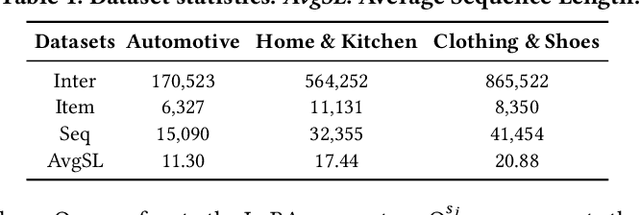
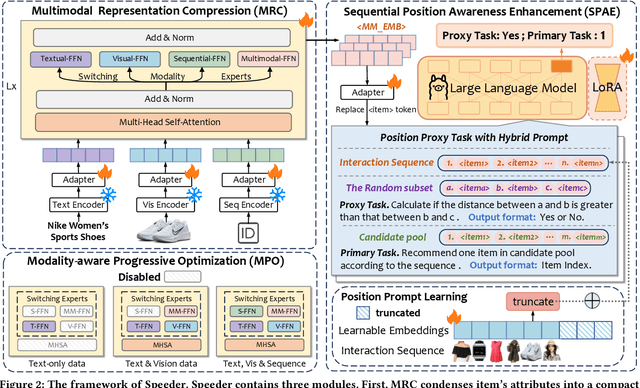
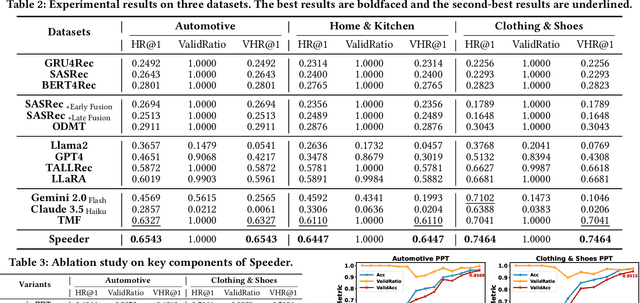
Abstract:Sequential recommendations (SR) predict users' future interactions based on their historical behavior. The rise of Large Language Models (LLMs) has brought powerful generative and reasoning capabilities, significantly enhancing SR performance, while Multimodal LLMs (MLLMs) further extend this by introducing data like images and interactive relationships. However, critical issues remain, i.e., (a) Suboptimal item representations caused by lengthy and redundant descriptions, leading to inefficiencies in both training and inference; (b) Modality-related cognitive bias, as LLMs are predominantly pretrained on textual data, limiting their ability to effectively integrate and utilize non-textual modalities; (c) Weakening sequential perception in long interaction sequences, where attention mechanisms struggle to capture earlier interactions, hindering the modeling of long-range dependencies. To address these issues, we propose Speeder, an efficient MLLM-based paradigm for SR featuring three key innovations: 1) Multimodal Representation Compression (MRC), which condenses item attributes into concise yet informative tokens, reducing redundancy and computational cost; 2) Modality-aware Progressive Optimization (MPO), enabling gradual learning of multimodal representations; 3) Sequential Position Awareness Enhancement (SPAE), improving the LLM's capability to capture both relative and absolute sequential dependencies in long interaction sequences. Extensive experiments on real-world datasets demonstrate the effectiveness and efficiency of Speeder. Speeder increases training speed to 250% of the original while reducing inference time to 25% on the Amazon dataset.
UW-3DGS: Underwater 3D Reconstruction with Physics-Aware Gaussian Splatting
Aug 08, 2025Abstract:Underwater 3D scene reconstruction faces severe challenges from light absorption, scattering, and turbidity, which degrade geometry and color fidelity in traditional methods like Neural Radiance Fields (NeRF). While NeRF extensions such as SeaThru-NeRF incorporate physics-based models, their MLP reliance limits efficiency and spatial resolution in hazy environments. We introduce UW-3DGS, a novel framework adapting 3D Gaussian Splatting (3DGS) for robust underwater reconstruction. Key innovations include: (1) a plug-and-play learnable underwater image formation module using voxel-based regression for spatially varying attenuation and backscatter; and (2) a Physics-Aware Uncertainty Pruning (PAUP) branch that adaptively removes noisy floating Gaussians via uncertainty scoring, ensuring artifact-free geometry. The pipeline operates in training and rendering stages. During training, noisy Gaussians are optimized end-to-end with underwater parameters, guided by PAUP pruning and scattering modeling. In rendering, refined Gaussians produce clean Unattenuated Radiance Images (URIs) free from media effects, while learned physics enable realistic Underwater Images (UWIs) with accurate light transport. Experiments on SeaThru-NeRF and UWBundle datasets show superior performance, achieving PSNR of 27.604, SSIM of 0.868, and LPIPS of 0.104 on SeaThru-NeRF, with ~65% reduction in floating artifacts.
RAID: An In-Training Defense against Attribute Inference Attacks in Recommender Systems
Apr 15, 2025Abstract:In various networks and mobile applications, users are highly susceptible to attribute inference attacks, with particularly prevalent occurrences in recommender systems. Attackers exploit partially exposed user profiles in recommendation models, such as user embeddings, to infer private attributes of target users, such as gender and political views. The goal of defenders is to mitigate the effectiveness of these attacks while maintaining recommendation performance. Most existing defense methods, such as differential privacy and attribute unlearning, focus on post-training settings, which limits their capability of utilizing training data to preserve recommendation performance. Although adversarial training extends defenses to in-training settings, it often struggles with convergence due to unstable training processes. In this paper, we propose RAID, an in-training defense method against attribute inference attacks in recommender systems. In addition to the recommendation objective, we define a defensive objective to ensure that the distribution of protected attributes becomes independent of class labels, making users indistinguishable from attribute inference attacks. Specifically, this defensive objective aims to solve a constrained Wasserstein barycenter problem to identify the centroid distribution that makes the attribute indistinguishable while complying with recommendation performance constraints. To optimize our proposed objective, we use optimal transport to align users with the centroid distribution. We conduct extensive experiments on four real-world datasets to evaluate RAID. The experimental results validate the effectiveness of RAID and demonstrate its significant superiority over existing methods in multiple aspects.
Distilling Transitional Pattern to Large Language Models for Multimodal Session-based Recommendation
Apr 13, 2025Abstract:Session-based recommendation (SBR) predicts the next item based on anonymous sessions. Traditional SBR explores user intents based on ID collaborations or auxiliary content. To further alleviate data sparsity and cold-start issues, recent Multimodal SBR (MSBR) methods utilize simplistic pre-trained models for modality learning but have limitations in semantic richness. Considering semantic reasoning abilities of Large Language Models (LLM), we focus on the LLM-enhanced MSBR scenario in this paper, which leverages LLM cognition for comprehensive multimodal representation generation, to enhance downstream MSBR. Tackling this problem faces two challenges: i) how to obtain LLM cognition on both transitional patterns and inherent multimodal knowledge, ii) how to align both features into one unified LLM, minimize discrepancy while maximizing representation utility. To this end, we propose a multimodal LLM-enhanced framework TPAD, which extends a distillation paradigm to decouple and align transitional patterns for promoting MSBR. TPAD establishes parallel Knowledge-MLLM and Transfer-MLLM, where the former interprets item knowledge-reflected features and the latter extracts transition-aware features underneath sessions. A transitional pattern alignment module harnessing mutual information estimation theory unites two MLLMs, alleviating distribution discrepancy and distilling transitional patterns into modal representations. Extensive experiments on real-world datasets demonstrate the effectiveness of our framework.
Bridging the Gap Between Preference Alignment and Machine Unlearning
Apr 09, 2025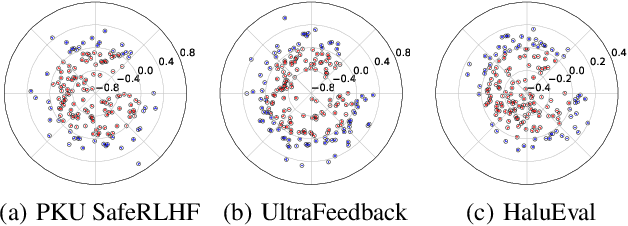
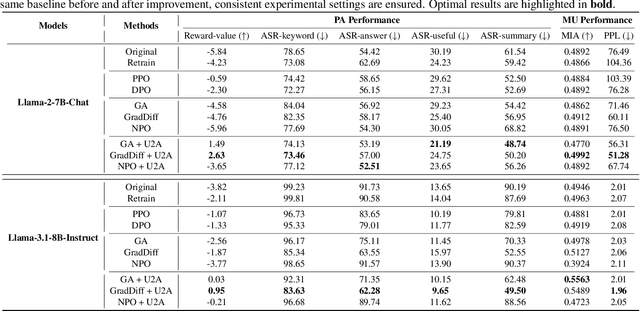


Abstract:Despite advances in Preference Alignment (PA) for Large Language Models (LLMs), mainstream methods like Reinforcement Learning with Human Feedback (RLHF) face notable challenges. These approaches require high-quality datasets of positive preference examples, which are costly to obtain and computationally intensive due to training instability, limiting their use in low-resource scenarios. LLM unlearning technique presents a promising alternative, by directly removing the influence of negative examples. However, current research has primarily focused on empirical validation, lacking systematic quantitative analysis. To bridge this gap, we propose a framework to explore the relationship between PA and LLM unlearning. Specifically, we introduce a bi-level optimization-based method to quantify the impact of unlearning specific negative examples on PA performance. Our analysis reveals that not all negative examples contribute equally to alignment improvement when unlearned, and the effect varies significantly across examples. Building on this insight, we pose a crucial question: how can we optimally select and weight negative examples for unlearning to maximize PA performance? To answer this, we propose a framework called Unlearning to Align (U2A), which leverages bi-level optimization to efficiently select and unlearn examples for optimal PA performance. We validate the proposed method through extensive experiments, with results confirming its effectiveness.
A Neuro-inspired Interpretation of Unlearning in Large Language Models through Sample-level Unlearning Difficulty
Apr 09, 2025Abstract:Driven by privacy protection laws and regulations, unlearning in Large Language Models (LLMs) is gaining increasing attention. However, current research often neglects the interpretability of the unlearning process, particularly concerning sample-level unlearning difficulty. Existing studies typically assume a uniform unlearning difficulty across samples. This simplification risks attributing the performance of unlearning algorithms to sample selection rather than the algorithm's design, potentially steering the development of LLM unlearning in the wrong direction. Thus, we investigate the relationship between LLM unlearning and sample characteristics, with a focus on unlearning difficulty. Drawing inspiration from neuroscience, we propose a Memory Removal Difficulty ($\mathrm{MRD}$) metric to quantify sample-level unlearning difficulty. Using $\mathrm{MRD}$, we analyze the characteristics of hard-to-unlearn versus easy-to-unlearn samples. Furthermore, we propose an $\mathrm{MRD}$-based weighted sampling method to optimize existing unlearning algorithms, which prioritizes easily forgettable samples, thereby improving unlearning efficiency and effectiveness. We validate the proposed metric and method using public benchmarks and datasets, with results confirming its effectiveness.
Reproducibility Companion Paper:In-processing User Constrained Dominant Sets for User-Oriented Fairness in Recommender Systems
Mar 29, 2025Abstract:In this paper, we reproduce experimental results presented in our earlier work titled "In-processing User Constrained Dominant Sets for User-Oriented Fairness in Recommender Systems" that was presented in the proceeding of the 31st ACM International Conference on Multimedia.This work aims to verify the effectiveness of our previously proposed method and provide guidance for reproducibility. We present detailed descriptions of our preprocessed datasets, the structure of our source code, configuration file settings, experimental environment, and the reproduced experimental results.
 Add to Chrome
Add to Chrome Add to Firefox
Add to Firefox Add to Edge
Add to Edge